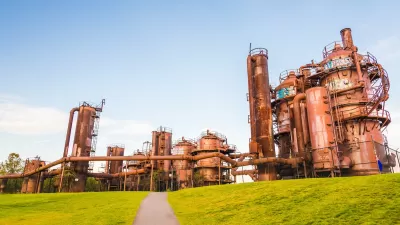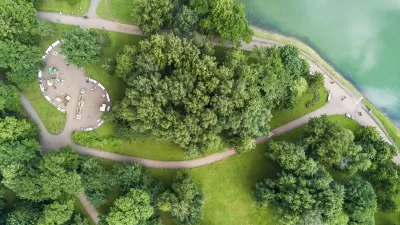Over 20 years, the TKF Foundation has funded the creation of dozens of “green refuges from the stresses of modern life”. With $4.5 million in funding for six new projects, they’re out to prove the physical and psychological benefits of such spaces.
In an increasingly urbanized world, we are bound to find a better connection with ourselves in nature than with our WiFi networks. At least that’s the idea that drives Tom Stoner, founder of the TKF Foundation, who along with his wife and colleagues have funded dozens of restorative green spaces throughout the Washington-Baltimore area via their Nature Sacred program, reports Sarah Goodyear.
The foundation recently announced $4.5 million in new grants for six projects, where “scientists from a number of different disciplines – neuroscience, immunology, genomics, and others – will work to study the effects of specially designed spaces on people living in an urban environment or who are otherwise under stress.”
Grant winners will study the impacts of a range of projects: from a landscaped refuge at a Maryland hospital to a verdant retreat in Brooklyn's Naval Cemetery, and a healing environ for tornado-devastated Joplin, Missouri.
Stoner's take on the word “sacred” is not meant to be religious, Goodyear adds. Rather, he suggests "[i]t’s a sense that these spaces are important, intimate. It’s about our individual, personal relationship with nature."
“[W]ith the development of better tools to assess stress levels and neurological response to stimuli, the time has come to measure that ineffable relationship,” Goodyear says. “Stoner thinks that quantitative proof of the health benefits of well-designed green space could go a long way toward encouraging better funding of the kind of places that we need to maintain our physical and mental health in a rapidly urbanizing world.”
FULL STORY: Green Spaces That Actually Calm the Mind and Body

Maui's Vacation Rental Debate Turns Ugly
Verbal attacks, misinformation campaigns and fistfights plague a high-stakes debate to convert thousands of vacation rentals into long-term housing.

Planetizen Federal Action Tracker
A weekly monitor of how Trump’s orders and actions are impacting planners and planning in America.

In Urban Planning, AI Prompting Could be the New Design Thinking
Creativity has long been key to great urban design. What if we see AI as our new creative partner?

King County Supportive Housing Program Offers Hope for Unhoused Residents
The county is taking a ‘Housing First’ approach that prioritizes getting people into housing, then offering wraparound supportive services.

Researchers Use AI to Get Clearer Picture of US Housing
Analysts are using artificial intelligence to supercharge their research by allowing them to comb through data faster. Though these AI tools can be error prone, they save time and housing researchers are optimistic about the future.

Making Shared Micromobility More Inclusive
Cities and shared mobility system operators can do more to include people with disabilities in planning and operations, per a new report.
Urban Design for Planners 1: Software Tools
This six-course series explores essential urban design concepts using open source software and equips planners with the tools they need to participate fully in the urban design process.
Planning for Universal Design
Learn the tools for implementing Universal Design in planning regulations.
planning NEXT
Appalachian Highlands Housing Partners
Mpact (founded as Rail~Volution)
City of Camden Redevelopment Agency
City of Astoria
City of Portland
City of Laramie





























